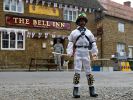Eye For Film >> Movies >> Way Of The Morris (2011) Film Review
When I visit England I often meet people who are envious of Scotland's sense of national identity. They tell me that, St George's Day celebrations aside, they don't feel there are many things that give them a real sense of Englishness - things removed from the reach of the far right, things that are positive. One such thing might be Morris dancing, but people tend to snigger at it. A group of men dressed up in silly clothes hitting each other with sticks and waving handkerchiefs and bells? Who wants to be associated with that?
In this gentle but insightful film, director Tim Plester sets out to answer that question. For him it's a deeply personal journey. His father was a Morris dancer. They dance in the village where he grew up. Dances like this have gone on there for hundreds of years. In a country where many supposed rural traditions are in fact recent inventions, Morris is one of the few really old things to survive, and it brings to this community a distinct sense of the passing of ages. There is also a tragic tale to tell here, as in the First World War the village's whole dance team went off to the front and onlt one survived. That severing of historic connections, the scything away of a generation, perhaps explains something of England's plight.

So what is Morris dancing really about? Being part of a group, the men here say; setting aside individuality (and so we explore the phenomenon but not the external lives of those involved). It's about fun - the ice is broken in an early scene by the Fool dancing as Darth Vader. And drinking seems to be a large part of it. Delicious pints of nut-brown ale on a summer's day. What's not to like? Getting closer to the Morris men and their customs, we come to understand that this is their thing, their fellowship, as much a source of pleasure because it is shared as for its own sake. Though the story is fascinating to an outsider who can get beyond the smirking, it isn't for outsiders, it's for them. Part of its appeal seems to be the sense of freedom that comes from realising it doesn't matter what the world thinks.
Plester is a good guide, a sympathetic yet initially wary outsider around whom tension slowly gathers as we know these men hope to initiate him too into the dance. There's a sense of ritual, of religiosity, abetted by Plester's invented creation myth and his lyrical use of language throughout. We learn of his childhood discovery of the Morris ways (and cowboys and astronauts) through old photographs, postcards, and clips of Super-8 film. We glimpse the men who revived the dance in the Seventies, and oh how Seventies they look, although their garb and the backdrop and unchanging. This is mere human time, innately pompous, aiming to stamp its identity onto something eternal.
Though a little slow in places and modest in ambition, Plester's film is a real charmer. It benefits from beautiful photography and a constant good-naturedness, giving a voice to working class men and rural populations who rarely find one in film. If this is the last of England, it's a fine thing, a thing to be proud of, and its absurdity is part of that - the Fool dressed like a member of the Batley Townswomen's Guild recalls a fierce humour that will resonate with those far from the soft green fields of Oxfordshire. A bold little tale, worth attending to.
Reviewed on: 06 Oct 2011


















